Holy Coast of Po Li
Overview
The Holy Nation of Po Li serves as a spiritual haven on the northern peninsula of the old Shou Empire. Po Li is revered as the final bastion of draconic devotion, and its culture is profoundly steeped in the veneration of the continent's ancient dragons. The peninsula's isolation; surrounded by the Sea of Conflict on three sides and bordered by the Heartlands of Shou Lang to the south, has allowed it to keep its traditions while avoiding most of the political decay that has plagued its southern neighbor. Across the water is the Shogunate of Minkai, a cultural and historical competitor to Shou Lang with whom Po Li had a strained relationship. Despite its limited size, Po Li is a land of immense spiritual and magical significance, as it is home to several ancient dragons who are venerated as living gods.
These dragons, vestiges of a time when their kind ruled Shou Lang, are actively involved in Po Li's governance and culture. Each dragon governs a specific territory or region, bestowing blessings, wisdom, and, on occasion, judgment on their followers. Pilgrims from all over the continent travel to Po Li to pay tribute to these entities and seek enlightenment at its vast temples, where the Oracle, the dragons' mortal voice, interprets their wishes. Though Po Li is not a traditional military power, its Dragon Monks, aided by the dragons' blessings and direction, are formidable national defenders. Combined with the dragons' deterrence, Po Li has maintained its sovereignty in the face of external pressure. This distinct relationship with its draconic patrons distinguishes Po Li as a region steeped in both veneration and mystery.
Governance in Po Li
The Holy Nation of Po Li is a theocracy founded on the devotion and guidance of its ancient dragons. The nation is divided into Draconic Dominions, each led by an ancient dragon who serves as a safeguard and spiritual advisor.
The Oracle
The Oracle is the pinnacle of Po Li's administration, a mortal chosen by the dragons to serve as their collective voice in questions of human governance and divine will interpretation. The Oracle is housed in the Temple of Celestial Scales, a vast edifice that serves as Po Li's spiritual and administrative center. While the dragons give general leadership, the Oracle oversees day-to-day operations, settles conflicts amongst Dominions, and conveys decrees to the people. The Oracle's legitimacy is undeniable, as they are thought to have been divinely selected and gifted with draconic powers.
Draconic Dominion
Each ancient dragon controls their Dominion autonomously, overseeing laws, traditions, and the well-being of their subjects. The dragons are seen as just but mysterious rulers, with decrees frequently steeped in cryptic wisdom. Their existence ensures stability since their enormous might discourages revolt and external invasion. While the dragons hold ultimate control, they rarely participate in human administration unless their domain is threatened or a crucial decision necessitates their involvement. This equilibrium gives the Oracle considerable administrative influence, while the dragons retain their revered and distant status.
Society in Po Li
Po Li's culture is based on a great spiritual veneration for dragons, who are regarded not only as rulers but also as living manifestations of divine wisdom and strength. This reverence pervades all aspects of life, from daily rituals to cultural customs, resulting in a culture that is both religious and highly regimented.
Social Stratification
Po Li is not feudal in the conventional sense, yet it is a very hierarchical society. At the top are the Dragons, who are revered as beings of the spirit world. The Priesthood lies underneath them, serving as intermediaries between dragons and mankind, interpreting draconic will and maintaining temples. The Oracle occupies a unique role, acting as the dragons' mortal voice. The Scholars and Artisans, who work below the priesthood, are well-known for their contributions to the preservation and advancement of draconic knowledge and culture. Merchants and farmers are the backbone of the economy, ensuring Po Li's self-sufficient civilization with little reliance on outside trade. Laborers are at the bottom of the hierarchy, and while their work is necessary, it is frequently regarded as less prestigious.
Devotion and Rituals
Dragon-related rituals pervade daily life. Families keep shrines in their houses, while larger populations congregate in temples for public rites. The most important rites are carried out at seasonal changes and draconic anniversaries, such as the hatching of a beloved dragon. At adolescence, everyone in Po Li goes through a Rite of Bonding, which is a spiritual ceremonial that symbolizes their relationship to the dragons. This ceremony consists of fasting, meditation, and a symbolic act of service to the local Dominion's dragon.
Education and Art
Education is a pillar of Po Li society, with a focus on literacy, history, and religion. Schools are frequently led by priests or monks who include draconic teachings into the curriculum. Those with great talent may be picked for further education, eventually becoming priests, scholars, or craftspeople. Art in Po Li is heavily influenced by draconic forms, with complex carvings, sculptures, and paintings showing dragons in various stages of life and myth. Music and dance frequently replicate the motions of dragons, resulting in a dynamic cultural manifestation. Poetry and literature regularly examine themes of wisdom, loyalty, and life cycles, demonstrating the dragons' effect on philosophy.




